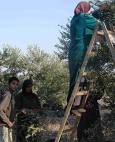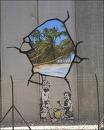
![]()
Index • |
Welcome • |
About
Us • |
21st Century • The Future |
World
Travel • Destinations |
Reviews • Books & Film |
Dreamscapes • Original Fiction |
Opinion
& Lifestyle • Politics & Living |
Film
Space • Movies in depth |
Kid's
Books • Reviews & stories |
The International Writers Magazine:Middle East Politics
Olive Picking Programme (Joint Advocacy Initiative) 2009
• Gemma Roxanne Williams
Volunteering in Palestine
I had just left full-time training at the Royal Military Academy Sandhurst in order to try and find a career that felt more worthwhile, something that would let me do my little bit to try and make the world a better place. And so it was that I was wading through the job pages of a million international development websites, and up popped an advert: “help Palestinian farmers”. So I found myself arriving at Ben Gurion airport, one week later with a hastily packed bag and no idea what to expect. The program was a mere 10 days of Olive Picking interspersed with talks, films and the token tourist tours, but I had no idea how those 10 short days could change things.
I went prepared to do some hard manual labour, what I hadn’t expected was that often the largest challenge was not the amount of olives to be picked, but attempting to gain access to the trees in the first place. There were times when we would drive 15 miles to get from a farmer’s house to his field, when it used to be a 5 minute walk before the wall was erected, cutting him off from his land. At one field we were refused entry by Israeli soldiers waving their weapons and threatening with rubber bullets and tear gas, and despite this wasted day of work the family took us back to their home and gave us sweet tea and a meal anyway. On the most part our group of volunteers from all around the globe were able to access the land and help with the crops, and the farmers were such gracious hosts and so grateful for our efforts that the programme was worthwhile for this alone.
However that glowing feeling that you get from helping others out, from experiencing a new culture and encountering the wonderfully warm people is only a small part of what the Olive Picking programme gives the volunteer. It also changes your perspective, of the situation there, of people and government and on humanity itself. One farmer told me, as we sat sifting through the olives in his peaceful groves under the midday sun that the settlements surrounding his farm would probably take over his land soon, that his home has a demolition order on it so it was merely a matter of time. He told me, with tears in his eyes of his daughter’s fear of leaving the house, of his patchy white skin being a result of being under siege in their home while his son and mother were shot through the window, of how the bodies had to lay there for three days before the soldiers would let them be taken out. And yet, when I asked how he kept going, where he found strength not to be angry, he told me that anger wasn’t the way.
He said that the only way for them to fight back was to continue to exist, so if their land was taken they must move and carry on, if their house was destroyed they must rebuild, if they lost people they would not bear arms in rage but pray and honour the dead by living in peace. To hear this from a man who had just described a life of horror and oppression, someone who has had his human rights violated in a few big ways, and in many small and persistent ways, left me in awe. When I asked what we could possibly do to help, his response was to do what we were doing. To come, and see how life really is, not just the statistics or the images on the news when things are really bad, but the everyday reality of a peaceful people who just want to feed their family, and go to work and have a roof to sleep under at night. And then to tell people, encourage others to come and see this beautiful place, these warm people and the difficult situation where only the extremists are winning. He wanted us to see what was happening, and to care.
Before the programme I had considered myself to have a fair idea of the situation in Israel and the Palestinian Territories, and yet 10 shorts days showed me that I didn’t have a clue. I went thinking that the Israeli’s were guilty only of accepting the land given to them that had been long promised, and that equally the Palestinians could only be blamed for fighting for their land back; both sides had a fair cause to argue. I went with the image of Israeli politicians arguing in offices and the Palestinian terrorists throwing rockets. I hadn’t expected the angry settlers, the route of the wall and the suddenly appearing checkpoints, and I certainly wasn’t prepared to find human rights violations, farmers whose land was being taken or families whose houses were being destroyed.
The small slice of land which the Palestinians are left with is not what they cry about, it is the freedom to live, with their human rights intact in this land that boys throw stones for and for which the families pray. I understood the problems to be historical, and that Gaza was an atrocity, but I didn’t realise that apartheid was going on in the Occupied Palestinian Territories while the rest of the world shook hands with Israel.
Image: BanksySome of those I was with had been made so angry by visits to this troubled Holy Land that they were anti-Israeli. I don’t think that that is right or helpful, there are many Israelis who want the same as the Palestinians, a home, a job, to feed their family; a life of peace. However the extreme actions of the state of Israel are quite clearly wrong, weigh it by international law or any moral code; limiting the movement, right to work or housing or education of a population is not justified by any excuse. The thing that I couldn’t understand was why I didn’t have a clue. I read the news, and I believed that all human beings should be treated equally, yet the stories seemed to be written in a very grey way which made it seem like any act of strength by Israeli soldiers was necessary; the wall was needed to protect from Palestinian terrorists, checkpoints were needed for security. Somehow articles and news coverage skipped around the black and white facts, the wall’s route would not wind amongst towns, cutting off Palestinians from Palestinians, if it was for Israeli security, and the checkpoints, if purely for security, would surely allow the shopkeeper to cross to his shop every day, or his child to go to school.
It seems that the media represents the facts in a way that says that everything is justified, that this thing is so complex and political that we cannot help. To some extent I understand, the situation is so complex that it cannot be easily fixed. Yet direct violations of human rights should be stopped in accordance with international humanitarian law, and to do this would not be some complex action but would simply require enough international awareness and the resulting political will. Solving the problem is not a simple act, but stopping the human rights violations, and allowing farmers like those I worked with to live their lives would be. With sufficient international political will, the Israelis would have to cease these violations and the Palestinians could stop being second-class citizens in their own lands.
The Olive Picking programme takes volunteers of all ages, from all over the world and shows them the beauty of this part of the world, allows them to encounter the warmth and joy of both the Palestinian and Israeli people, and leaves them desperately wishing that then when they next return they will find equality, and peace, and a land full of a wonderful diversity of cultures, religions and ethnicities, without this diversity causing war.© Gemma Roxanne Williams Jan 13th 2010
http://visitpalestine.webs.com/treeplantingfebruary2010.htm
More Comment


